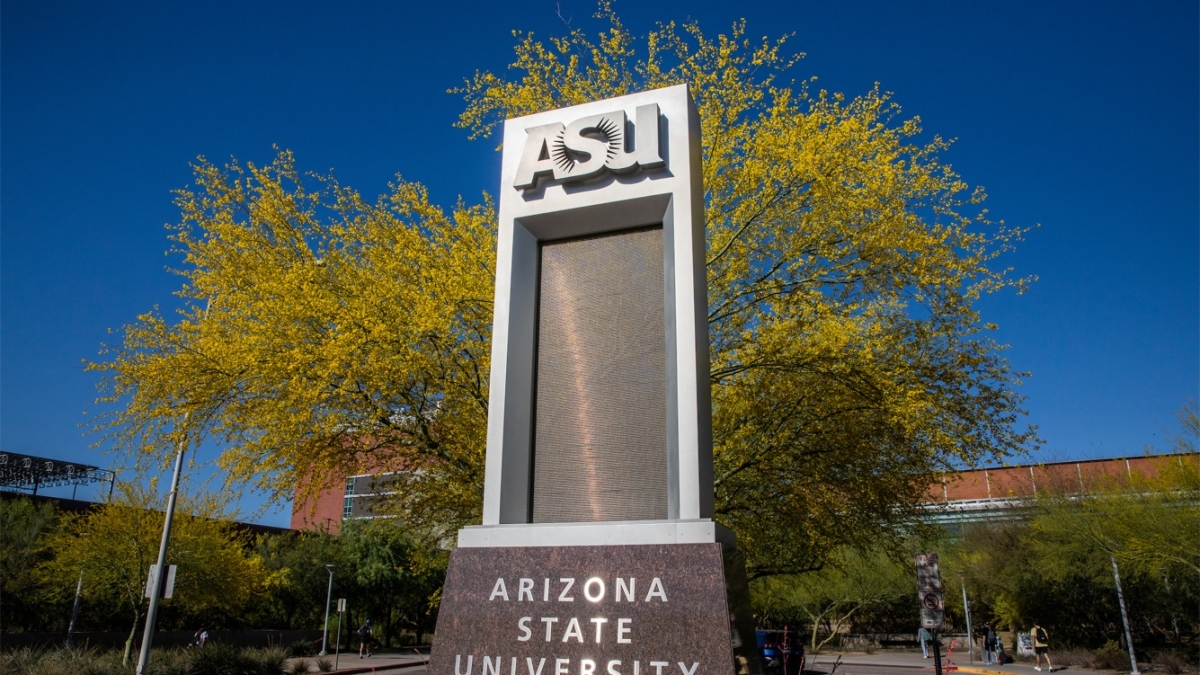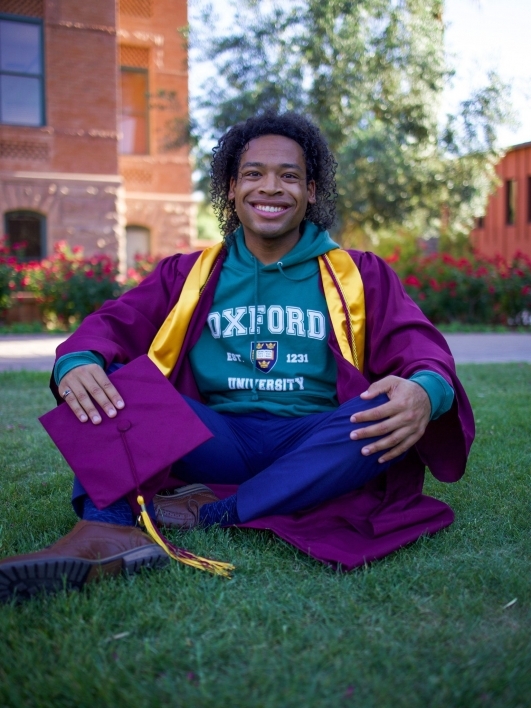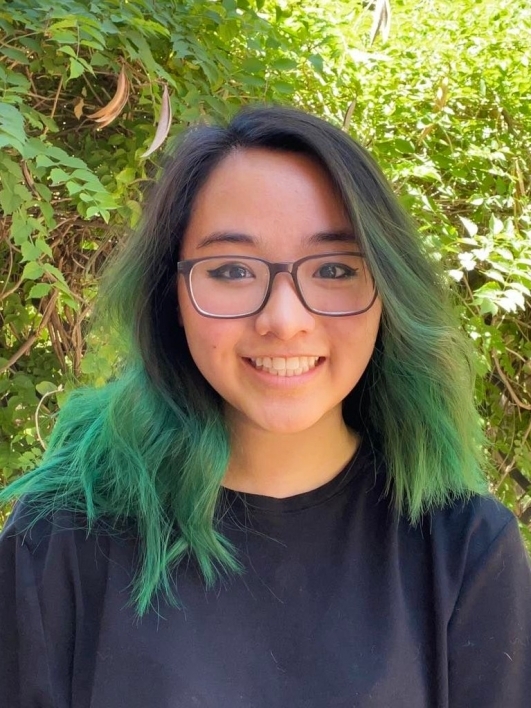As the old adage goes, it’s not about where you start — it’s where you end up.
Every year, hundreds of ASU students and alumni apply for national scholarships and fellowships under the guidance of the Lorraine W. Frank Office of National Scholarships Advisement, or ONSA, which helps them identify and prepare applications for scholarships, fellowships and grants that are open to a national or international pool, such as the Rhodes, Goldwater or Marshall Scholarships.
And, while hundreds apply, not all of them win. In fact, only a minority win the fellowships that they apply for.
“We are bluntly honest with our students about their odds of winning,” said Kyle Mox, associate dean of national scholarship advisement and director of the Office of National Scholarships Advisement. “In some cases, their odds are as low as 1 or 3%. But we also tell them: You can’t win if you don’t play.”
Applicant pools for larger fellowships can range from over 6,000, for the Knight-Hennessy Scholarship, to over 10,000, for the Fulbright U.S. Student program. Given the large numbers of applicants and the small number of awards, most who apply don’t get the answer that they had hoped for.
But according to Mox, the story usually doesn’t end there. “I like to tell our students that a ‘no’ is just a moment of conflict in their story,” Mox said. “Everyone is the hero of their own story, and the hero of a good story always gets back up and continues on the quest.”
So, what happens to ONSA students who do not win a fellowship?
“What many students discover is that the skills that they develop while crafting a competitive application for a national scholarship are highly transferrable to other contexts,” Mox said.
A champion for environmental justice
One such student is ASU senior William Walker VI, who had applied for numerous awards during his undergraduate years. Walker — who is an Ahwatukee, Arizona, native — will graduate in May with a Bachelor of Science in sustainability and a minor in French.
Initial success in fellowships came early for Walker — as a freshman, he was accepted into the Doris Duke Conservation Scholars Program, a two-year fellowship that serves to strengthen the conservation profession by inspiring and educating undergraduate students from across the country.
Walker cites his time as a Doris Duke Conservation Scholar as transformative. “(It) made me realize that my sustainability concerns were rooted in biocultural conservation, ecological accessibility and environmental justice,” Walker said. “The program focused heavily on these themes and has prepared me for a life of service to people and the planet.”
From there, he applied for the Udall Undergraduate Scholarship, a federal fellowship that recognizes leaders in both environmental fields and Native Americans who are pursuing careers in tribal public health and public policy. He was nominated by ASU, but did not receive the scholarship.
“The Udall application process was difficult because I had a hard time expressing my skills and experiences,” Walker said. “But it was enlightening because it made me realize the impact I have made on my community. When I was not selected, I experienced sorrow and anguish because I felt it was meant for me. However, it was a turning point because it meant there were better opportunities in store.”
William Walker VI has won a full scholarship to pursue a Master of Science in sustainability, enterprise and the environment at Oxford University. Photo courtesy of the Office of National Scholarships Advisement
Persistent and motivated, Walker also applied for the Truman Scholarship, another federal fellowship that provides mentoring, high-level internships, and $30,000 to support graduate study leading to a career in government or public service.
“Each university may only nominate four students per year,” Mox said. “And William was not among those four, unfortunately. Our applicant pool at ASU is typically quite strong, and there were some students in the pool who our committee felt were better fits for the selection criteria. That doesn’t mean we didn’t think he’s an amazing student — national scholarships typically have very narrow selection criteria.”
Heading into his senior year, Walker decided to throw his hat into the ring for a number of major postgraduate fellowships, including the Marshall and Rhodes Scholarships, which fund graduate study in the U.K., and the Schwarzman Scholarship, which provides leadership development programming and full funding for a master’s degree at Tsinghua University in Beijing. His summer schedule proved too challenging, and he did not complete the nomination application for the Rhodes or Marshall, but did submit an unsuccessful application for the Schwarzman.
“My life was very active last summer,” Walker recalled. “I was working as a program assistant for the College of Global Futures and as a field and laboratory aide for the Central Arizona-Phoenix Long-Term Ecological Research (CAP LTER) project. I started applications for Rhodes and Marshall but ultimately decided on applying to Schwarzman.”
Even though his bid was unsuccessful, Walker reflected on it as just another building block.
“It was the first rejection where I felt I could move on and be a stronger applicant elsewhere,” he said.
He applied the writing skills that he developed toward an admission application for the Master of Science in sustainability, enterprise and the environment at Oxford University, a program that he discovered during his preparation for the Truman and Udall Scholarships.
“This unique interdisciplinary program attracted me early on because I wanted to gain business knowledge in sustainability to fund ecological projects and advance economic empowerment for underprivileged communities,” Walker said.
As he began the application process, Walker drew upon his previous experience with fellowship applications.
“I used feedback from ONSA and some of my peers to strengthen my Oxford application,” he said. “I learned through ONSA that the strongest stories have an ‘inciting incident,’ so I wrote about three inciting incidents that heightened my sustainability knowledge: my Doris Duke program and how it drove me to environmental justice principles, my conservation work with CAP LTER, and my study abroad in Denmark, where I experienced progressive urban sustainability measures.”
Within weeks, he received an offer of admission.
“When I found out I received acceptance, I visited all of my family and best friends to tell them the news," he said. "Two weeks later, I received a full scholarship for my program. I see this as not just my accomplishment, but the achievement of everyone who has supported me all my life. They brought me to this moment.”
A Renaissance woman
When Rachael Kha began her fellowships journey, she was surer about what she didn’t want to do than she was about what she wanted to do.
Kha’s intellectual interests are admittedly broad: In 2021, she completed bachelor’s degrees in chemical engineering, philosophy and economics with honors from Barrett, The Honors College at ASU. In May, she will graduate from ASU with a master’s in chemical engineering.
“Around graduation, I knew that I was going to continue at ASU for the 4+1 Chemical Engineering Master’s program in control systems with Dr. Daniel Rivera, but I didn’t know what I was going to do after,” the Chandler, Arizona, native said. “I knew I didn’t want to do anything that was within the traditional chemical engineering scope, but I also didn’t think I had enough of a background in philosophy or economics to switch to either of those.”
Given that the Rhodes and Marshall Scholarships provide two years of full funding for graduate study in any field of study, Kha saw it as an opportunity to unite her varied intellectual passions.
“My interests are generally within decision theory, epistemology and control systems, which don’t fall neatly into any single field, so I also wasn’t sure if I would find what I was looking for in philosophy or economics,” she said. “When I got an email about Rhodes and Marshall, I saw it as an opportunity to continue studying fields that better support my interests, and to get more experience outside of engineering. I applied for these scholarships hoping that in getting one, I would have the flexibility I needed to dive deeper into my interests, which are interdisciplinary, and learn more about research in those fields.”
Before applying to either fellowship, applicants must be nominated by their home university. At ASU, the process is managed by the Office of National Scholarships Advisement, with the nomination decisions being made by a select faculty committee, which evaluates candidates on the basis of their written materials, letters of recommendation and interview performance. Kha applied for and received the nod.
Rachael Kha has received substantial funding from the National Science Foundation Graduate Research Fellowship Program to study for a doctorate at the Massachusetts Institute of Technology. Photo courtesy the Office of National Scholarships Advisement
“(Getting nominated) felt really validating because throughout undergrad, I pretty much just accepted that I would probably get a job in chemical engineering, and everything I did in philosophy and economics would just be ’fun’ things I did on the side. Even when I added each of them as a major, I didn’t have any specific plans, I just enjoyed them. But after I was nominated, I felt like I could really do something with all three.”
Following her campus committee interview, Kha put the final touches on her materials and submitted her applications.
“Between nomination and submitting my applications, I spent a lot of time deliberating on my personal statements, because the committee was sort of divided about my introduction,” Kha said. “I had written a story about getting my wisdom teeth pulled out, receiving a betta fish as a ‘feel better’ gift from a friend and naming it after the sociologist Émile Durkheim, which some people found funny and others thought made no sense.
“I decided to go with a more straightforward introduction in my Marshall application and kept the betta fish story in my Rhodes application. I figured that the odds of getting Rhodes were lower than getting Marshall, so I decided to take the risk. And I guess it kind of paid off!”
Within weeks, she discovered that she had been selected as a finalist for the Rhodes Scholarship and would be interviewing with a regional interview panel on the weekend before Thanksgiving.
“The Rhodes Scholarship interviews are infamous,” Mox said. “Typically, two dozen or so finalists travel to one of 16 different selection districts, get to know each other and the committee members at a reception or dinner, and then spend the entire next day together while they take turns interviewing.”
Thirty-two American Rhodes Scholarships are offered each year, with each district selecting only two scholars.
“The interviews themselves are stressful, since the questions can be about anything and everything,” Mox said.
To help ASU finalists feel more confident, the Office of National Scholarships Advisement organizes several preparatory interviews leading up to the Rhodes interviews. Finalists can spend dozens of hours answering practice questions from ASU faculty members, high-ranking staff, community leaders and even former applicants and scholars.
“The interview preparation process was pretty overwhelming, but it was also an incredible experience,” Kha said. “It felt all-consuming. I had practice interviews most days leading up to the actual interview, and I spent a lot of time reading up on current events in Europe.”
Kha recognized the inherent value of the process, however.
“The interview preparation with ONSA was also amazing because I got help from so many professors across all departments, prior finalists and even scholarship directors from other universities,” she said. “It was really interesting to get so much feedback from so many perspectives.”
Although this year’s interviews were conducted via Zoom for public health reasons, they were no less stressful. Just as with the in-person interviews, all finalists are brought together to hear the final result. Kha did not hear her name called.
“I was pretty disappointed. Mainly because in the two weeks leading up to the interview, I couldn’t bring myself to think about or do anything but prepare for Rhodes. It was definitely the most interview prep I’ve done in my entire life. And given the amount of support I received throughout the process, I was really hoping I could report back with good news.”
Kha’s disappointment was short-lived, however, and she quickly pivoted to the National Science Foundation Graduate Research Fellowship Program (NSF-GRFP), a federal fellowship that provides substantial funding for advanced graduate study in NSF-supported fields of study.
“I emailed Dr. Rivera to let him know that I was going to apply for the NSF-GRFP about two weeks before it was due,” Kha said. “But since I already had about 23 personal statement drafts and a bunch of letters of recommendation from the Rhodes and Marshall process, I was able to get my application materials quickly. The part that needed the most work was my research proposal, which I got a lot of help with from Dr. Rivera and one of our collaborators, Dr. Eric Hekler at UCSD.”
Since the deadline for the NSF-GRFP is in late October, applicants do not always know where they will be using the funds. Throughout her preparation for the Rhodes interview, Kha had been asked repeatedly to articulate her personal and professional goals. And, after some focused searching, she discovered the PhD program in social and engineering systems at the Massachusetts Institute of Technology.
“It was everything I wanted in a program, and pretty much exactly what I was trying to achieve through Rhodes,” Kha said.
She was admitted to MIT, and in early April, she was notified that she had received the NSF-GRFP, which will provide five years of support and over $130,000 in funding.
“I am so incredibly grateful for the help I received throughout the Rhodes process. Most of the ideas in my MIT personal statement started out as unfinished thoughts and connections that I explored through my Rhodes application and practice interviews,” Kha said. “The process also helped me gain a lot more confidence and helped me more fully embrace the diversity of my interests.
“I am also so thankful for the many people and professors who gave me feedback and who wrote me letters of recommendation. I was really surprised that so many people were willing to offer their time, especially seeing as they continued to support me in my applications after Rhodes.”
Opening the next chapter
For Kha, Walker and dozens of other applicants, the first word of the next chapter of their lives is “no.”
“These are the stories that keep me and the rest of the staff at ONSA motivated,” Mox said. “There are so many variables at play in the fellowships process, not the least of which is the subjectivity of the selection committees. We remind our students to only focus on what they can control and not worry about what they can’t. I’m so proud of both of William and Rachael, and all of our applicants who commit themselves to the process of learning and discovery that fellowships offer.”
Both Walker and Kha will graduate from ASU in May. As for long-term plans, they have different perspectives, both of which have been shaped by the fellowships application process.
“After graduating from Oxford, I intend on creating a foundation centered on urban biodiversity and rewilding so that anyone, regardless of their background, can see themselves as an environmentalist and an advocate for the planet,” Walker said.
“I’m not entirely sure what I want to do after MIT,” Kha said. “I’m considering trying industry for a bit and then going back to academia, but it really just depends on what I do when I get there. I usually only think about two years into the future, because I’ve found that I change my mind a lot anyway (which has its pros and cons). But ultimately, I think that there’s going to be a lot of opportunities at or around MIT that I can’t really plan for, and so I’m just excited to see what happens.”
Wherever their stories lead them, both Kha and Walker have learned that “success” in life is a matter of perspective.
Walker agrees.
“Never give up. Never lose hope,” he said. “Never lose sight of your goals and aspirations. Rejection can feel like grief, I understand the feeling. Reframe the narrative. Rejection is redirection. 'No' is new opportunity.”
Story submitted by the Office of National Scholarships Advisement.
More Sun Devil community
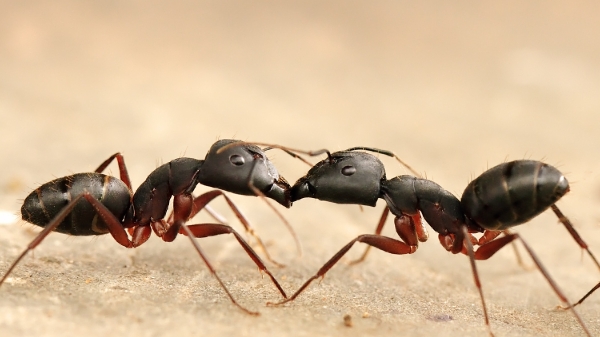
Army veteran dedicates PhD to exploring the social order of ant colonies
While Colin Lynch was enlisted as a medic in the National Guard, he had a pastime that was quite different from that of his peers…
College of Health Solutions grad, soccer star hopes to make the big leagues
A staple lineup defender on the Sun Devil women’s soccer team, Lauren Kirberg is looking to join the National Women’s Soccer…
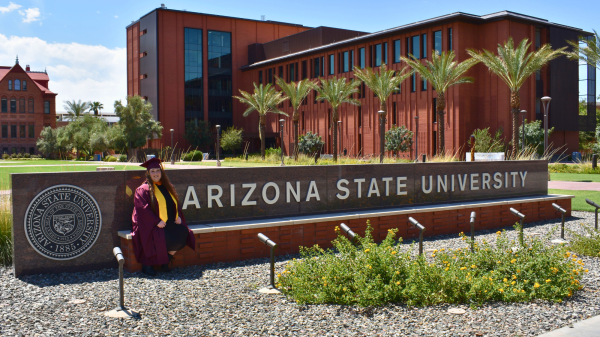
ASU grad finds her calling in advocating for people through clinical research
Rhiannon Elliott-McGaugh-Mask grew up hundreds of miles away from an ocean, but that wasn’t an issue when deciding her future…
